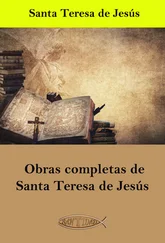1See Way of Perfection , ch. liii., but ch. xxxii of the old edition.
2St. Matt. xvii. 4: "Bonum est nos hic esse."
3See ch. xvii. § 6.
4Ch. x. § 1.
5Ch. xiv. §§ 3, 4.
6Ch. x. § 9.
7Ch. xviii. § 4, and ch. xxi. § 9.
8§ 3.
9§ 5.
10Ch. x. § 1.
11St. Luke xviii. 13: "Nolebat nec oculos ad coelum levare."
12Ch. xii. § 5.
13"Firmeza en la verdad." Francisco de St. Thoma, in his Medulla Mystica, p. 204, quoting this passage, has, "firmeza en la voluntad." Philip a SS. Trinitate, Theolog. Mystic. p. 354, and his Abbreviator, Anton. a Sp. Sancto, Direct. Mystic. tr. iv. disp. i. § 11, n. 94, seem also to have preferred "voluntad" to "verdad;" for the words they use are, "nec intellectui lux nec voluntati firmitas;" and, "defectus lucis in intellectu, et firmitatis in voluntate."
14Ch. xi. § 16.
15Ch. xiii. § 23.
16St. Matt. xvi. 24: "Tollat crucem suam et sequatur Me."
17"Fiel temor." In the previous editions it was filial .
18Ch. xi. § 1.
19See ch. xxv.
Table of Contents
The Third State of Prayer. Deep Matters. What the Soul Can Do That Has Reached It. Effects of the Great Graces of Our Lord.
1. Let us now speak of the third water wherewith this garden is watered,--water running from a river or from a brook,--whereby the garden is watered with very much less trouble, although there is some in directing the water. 1In this state our Lord will help the gardener, and in such a way as to be, as it were, the Gardener Himself, doing all the work. It is a sleep of the powers of the soul, which are not wholly lost, nor yet understanding how they are at work. The pleasure, sweetness, and delight are incomparably greater than in the former state of prayer; and the reason is, that the waters of grace have risen up to the neck of the soul, so that it can neither advance nor retreat--nor does it know how to do so; it seeks only the fruition of exceeding bliss. It is like a dying man with the candle in his hand, on the point of dying the death desired. It is rejoicing in this agony with unutterable joy; to me it seems to be nothing else but a death, as it were, to all the things of this world, and a fruition of God. I know of no other words whereby to describe it or to explain it; neither does the soul then know what to do,--for it knows not whether to speak or be silent, whether it should laugh or weep. It is a glorious folly, a heavenly madness, wherein true wisdom is acquired; and to the soul a kind of fruition most full of delight. 2
2. It is now some five or six years, I believe, since our Lord raised me to this state of prayer, in its fulness, and that more than once,--and I never understood it, and never could explain it; and so I was resolved, when I should come thus far in my story, to say very little or nothing at all. I knew well enough that it was not altogether the union of all the faculties, and yet most certainly it was higher than the previous state of prayer; but I confess that I could not determine and understand the difference.
3. The humility of your reverence, willing to be helped by a simplicity so great as mine, has been the cause, I believe, why our Lord, to-day, after Communion, admitted me to this state of prayer, without the power of going further, and suggested to me these comparisons, and taught me how to speak of it, and of what the soul must do therein. Certainly, I was amazed, and in a moment understood it all. I have often been thus, as it were, beside myself, drunk with love, and yet never could understand how it was. I knew well that it was the work of God, but I never was able to understand the manner of His working here; for, in fact, the faculties are almost all completely in union, yet not so absorbed that they do not act. I have been singularly delighted in that I have been able to comprehend the matter at last. Blessed be our Lord, who has thus consoled me!
4. The faculties of the soul now retain only the power of occupying themselves wholly with God; not one of them ventures to stir, neither can we move one of them without making great efforts to distract ourselves--and, indeed, I do not think we can do it at all at this time. Many words are then uttered in praise of God--but disorderly, unless it be that our Lord orders them himself. At least, the understanding is utterly powerless here; the soul longs to send forth words of praise, but it has no control over itself,--it is in a state of sweet restlessness. The flowers are already opening; they are beginning to send forth their fragrance.
5. The soul in this state would have all men behold and know of its bliss, to the praise of God, and help it to praise Him. It would have them to be partakers of its joy; for its joy is greater than it can bear. It seems to me that it is like the woman in the Gospel, who would, or used to, call in her neighbours. 3The admirable spirit of David, the royal prophet, must have felt in the same way, so it seems to me, when he played on the harp, singing the praises of God. I have a very great devotion to this glorious king; 4and I wish all had it, particularly those who are sinners like myself.
6. O my God, what must that soul be when it is in this state? It wishes it were all tongue, in order that it may praise our Lord. It utters a thousand holy follies, striving continually to please Him by whom it is thus possessed. I know one 5who, though she was no poet, yet composed, without any preparation, certain stanzas, full of feeling, most expressive of her pain: they were not the work of her own understanding; but, in order to have a greater fruition of that bliss which so sweet a pain occasioned her, she complained of it in that way to God. She was willing to be cut in pieces, soul and body, to show the delight she felt in that pain. To what torments could she be then exposed, that would not be delicious to endure for her Lord? She sees clearly that the martyrs did little or nothing, so far as they were concerned, when they endured their tortures, because the soul is well aware that its strength is derived from another source.
7. But what will be its sufferings when it returns to the use of the senses, to live in the world, and go back to the anxieties and the fashions thereof? I do not think that I have exaggerated in any way, but rather have fallen short, in speaking of that joy, which our Lord, of His good pleasure, gives to the soul in this its exile. Blessed for ever be Thou, O Lord! and may all created things praise Thee for ever!
8. O my King, seeing that I am now, while writing this, still under the power of this heavenly madness, an effect of Thy mercy and goodness,--and it is a mercy I never deserved,--grant, I beseech Thee, that all those with whom I may have to converse may become mad through Thy love, or let me converse with none, or so order it that I may have nothing to do in the world, or take me away from it. This Thy servant, O my God, is no longer able to endure sufferings so great as those are which she must bear when she sees herself without Thee if she must live, she seeks no repose in this life,--and do Thou give her none. This my soul longs to be free--eating is killing it, and sleep is wearisome; it sees itself wasting the time of this life in comforts, and that there is no comfort for it now but in Thee; it seems to be living contrary to nature--for now, it desires to live not in itself, but in Thee.
9. O my true Lord and my happiness! what a cross hast Thou prepared for those who attain to this state!--light and most heavy at the same time: light, because sweet; heavy, because now and then there is no patience left to endure it--and yet the soul never wishes to be delivered from it, unless it be that it may come to Thee. When the soul remembers that it has never served Thee at all, and that by living on it may do Thee some service, it longs for a still heavier cross, and never to die before the end of the world. Its own repose it counts as nothing in comparison with doing a slight service to Thee. It knows not what to desire; but it clearly understands that it desires nothing else but Thee.
Читать дальше












